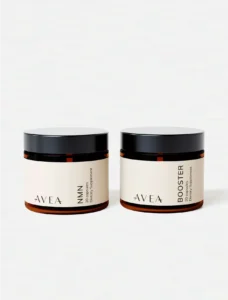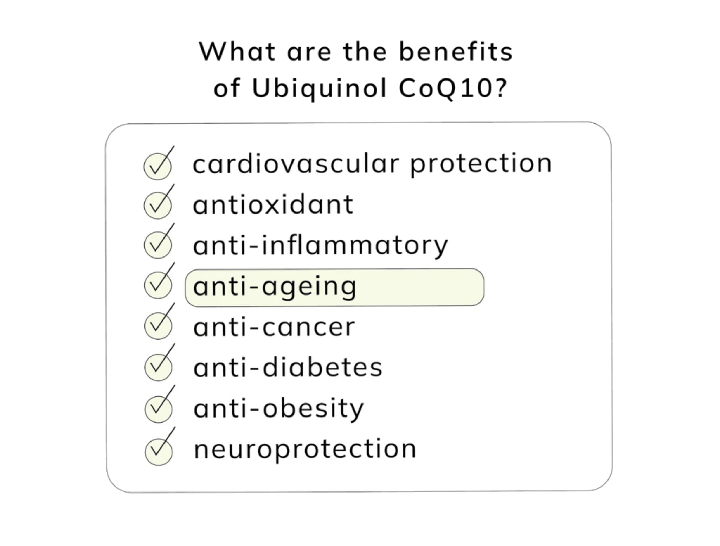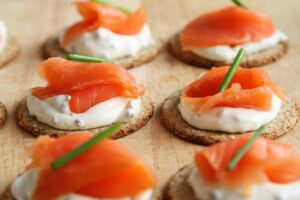Ubiquinol is also known as CoQ10. Its diverse proven benefits explain why researchers and the longevity community are so obsessed about it.
Would you like to learn more about this crucial molecule before joining the crowd? Avea is here to help.
Whilst your body naturally produces CoQ10, its concentrations decline with age as well as through fatigue, strenuous exercise, smoking, illness, and even some medications.
CoQ10 has an essential role in supplying all your cells with energy. To learn how your CoQ10 level can be easily restored and maintained, check out our article and learn why we, at Avea, are so keen to share about this valuable antioxidant with you.
In this article
Free guide to reverse your biological age

- Master the science of rejuvenation.
- Apply proven tips to turn back the clock.
- Transform your health with top longevity specialists.
Which is better, Ubiquinol or CoQ10?
Coenzyme Q10 or CoQ10 is naturally present in two forms in your body: ubiquinol (95%), which is the active, antioxidant form, and ubiquinone (5%), the oxidised form that the body must convert into ubiquinol for use.
Ubiquinol is often preferred due to its higher bioavailability, especially as we age, whilst ubiquinone may require more conversion steps to become effective.
Ubiquinol is primarily responsible for the antioxidant and vitamin-like benefits of CoQ10.
No stress, let’s try to break down the science.
Coenzyme Q10 in mitochondrial function
Nearly each of the trillions of cells in your body houses thousands of mitochondria.
These organelles are called ‘powerhouses’ of the cell, since they produce the energy your cells need to function in the form of ATP (Adenosine Triphosphate). Discover how to improve your mitochondrial health.
Amongst the most important enzymes involved in the human energy cycle is Ubiquinol.
As a matter of fact, your body’s most energy-demanding organs have the highest levels of mitochondria, thus, the highest levels of CoQ10. These include your heart, brain, kidneys, muscle, and liver.
Why do we need CoQ10?
Similarly to a car, a cell requires its fuel to function. CoQ10 acts as the fuel additive that optimises mitochondrial performance, extracting the most energy with the least damage [1].
Without CoQ10, the cell is compromised and cannot function correctly, thereby affecting overall health.
Inadequate levels of CoQ10 in the mitochondria may cause tiredness, fatigue, as well as mental fog, but in the long run, things may get worse.
What causes low CoQ10 levels?
Several factors can contribute to low levels of CoQ10 in the body, including:
- Genetic defects affecting CoQ10 production and utilisation
- Increased tissue demands due to illness or disease
- Mitochondrial disorders
- Oxidative stress linked to ageing
- Side effects from statin medications
What does CoQ10 supplementation help with?
CoQ10 protects cell membranes from oxidative damage caused by free radicals, the harmful molecules that damage cells and contribute to ageing and disease [2].
By supplementing with CoQ10, you can support various aspects of your health:
- Protection against neurodegenerative diseases and mental health disorders [3]
- Support for heart and vascular health [4]
- Enhanced lung function [5]
- Maintenance of healthy blood cholesterol levels
- Protection from the damaging effects of elevated glucose in diabetes and metabolic syndrome [6]
The best Ubiquinol (CoQ10) supplement
Our Booster features an ideal dose of CoQ10, with 5 other potent antioxidants combined with olive oil for maximal absorption.
Designed to optimise cellular health, it targets multiple hallmarks of ageing and ensures optimal NAD+ levels when used with our NMN.
The best anti-ageing supplements

- All-star longevity ingredients like NMN, Resveratrol, CoQ10, and more.
- Promote healthier ageing at the cellular level.
- Maximise your energy production.
- Improve your mental clarity and focus.
Why does Avea use Ubiquinol in our supplements?
We’ve included Ubiquinol in our Booster supplement as it is the active, more bioavailable, antioxidant form of CoQ10—it’s ready for immediate use by the body.
Ubiquinol is an ideal complement to our NMN product (a potent NAD+ precursor) since Ubiquinol works in synergy with NAD+ to support energy-production and mitochondrial health in every cell of your body.
It’s important to note that your body doesn’t store CoQ10. Therefore, to see continued benefits, it’s essential to keep up a supplement routine.
Where can Ubiquinol be found in nature?
You can find CoQ10 in meats including, pork, beef, chicken, fatty fish, and organ meat, vegetables such as broccoli, cauliflower and spinach, fruits such as oranges and strawberries, as well as in legumes, sesame seeds, pistachios and peanuts.
To get the recommended 100 mg per day, you would have to eat around 3.5 kg of beef, 120 cans of sardines or 60 avocados a day. On the other hand, the CoQ10 you find in supplements is manufactured via a natural yeast fermentation process and is highly-effective.
How much CoQ10 should I take per day?
The ideal daily dosage of CoQ10 varies depending on individual needs and health goals.
Research suggests that for heart health, doses between 100 to 400 mg per day are effective, whilst higher doses up to 3,000 mg may be used for certain neurodegenerative conditions.
Avea offers 100 mg of CoQ10 per capsule, formulated to complement the CoQ10 you get naturally from a balanced diet.
This approach ensures you achieve optimal levels without relying solely on supplements.
Taking CoQ10 with food enhances absorption, and soft-gel capsules or oil-based formulations may improve its uptake further.
When to take CoQ10 supplement?
For optimal energy support, we recommend taking CoQ10 in the morning with breakfast, as it helps fuel your cells for the day ahead.
Whilst taking it with food can improve absorption, Avea’s CoQ10 is formulated with olive oil, which enhances absorption on its own—so you can also take it without a meal if needed.
Avea’s keynote

References










